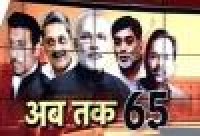Honey, I shrunk the editorial...
Nothing is better for an editorial than to be reduced, condensed, whittled away at. Let me show you how it's done,
says DARIUS NAKHOONWALA

You don’t say!
Darius Nakhoonwala
On June 21, I had written that it would be far more effective if newspapers limited their editorials to about 200 words or less. To show them how this could be done, I had reduced their edits on governors and new central governments to 140 characters, which is the length of a tweet.
Now here is one more example of that because, really, no one wants to read long-winded editorials of uncertain quality that are full of biases. Editorials tend to be too wordy because the designers have fixed the space for them; they tend to be uninformed about key motivations; and they tend to reflect the prejudices of editors.
Thanks to Twitter and Facebook, far better opinions – pithy and sensible – are available on those platforms. Anyway, bon aperitif.
The Indian Express: The NDA was the loser as Prime Minister Narendra Modi expanded his ministry to a strength of 66, just 12 less than the UPA’s peak tally during 2009-2014. Modi inducted 21 more ministers on Sunday, but barring the TDP representative, the rest are from the BJP. Even after the mega expansion on Sunday, the Modi ministry has a lopsided look, with some regions and communities under-represented. Read "Private party".
The Hindu: In his quest for as coalition-free a government as possible, Mr. Modi evidently intends to use the BJP’s impressive electoral mandate to minimise the role of tantrum-throwing partners. Read "Addressing competing demands".
The Telegraph: There are enough facts to support the assertion that this dispensation is carrying on, maybe more efficiently and more honestly, along the lines laid down by the two previous United Progressive Alliance governments. Read "More ministers".
The Times of India: If PM Modi’s cabinet expansion on Sunday showed a welcome desire for a facelift of the Union government, the allocation of portfolios has thrown up (several) questions. Read Some performers appointed but questions remain about portfolio allocation".
The Pioneer: Individual competence, electoral needs and better regional representation are factored into Prime Minister Narendra Modi's expansion and rejig of his Council of Ministers on November 9. Read "Modi's crack team".
The Hindustan Times: The overriding sentiment is that while regional and caste considerations have been taken into account, there can be no slackers in this government. Read "From trot to steady canter: BJP's balancing act".
Mint: The promise of minimum government does not seem to have come in the way of creating another jumbo council of ministers.
The Financial Express: Given how many of the ministerial mergers - finance and defence, telecom and law - never made sense, Narendra Modi has done well to expand his cabinet and do away with the forced mergers made in the name of minimum-government-maximum-governance. Read "Mid-course corrections".
Such articles are only possible because of your support. Help the Hoot. The Hoot is an independent initiative of the Media Foundation and requires funds for independent media monitoring. Please support us. Every rupee helps.
Subscribe To The Newsletter






